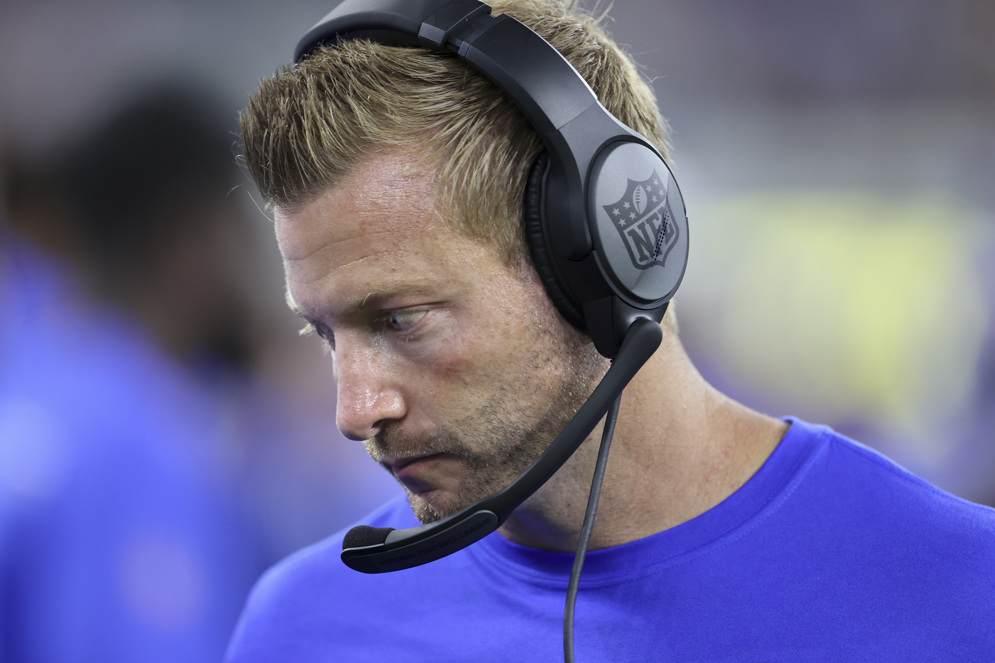NFL Event Frequency Coordinators
Keeping the lines of communication clear on gameday.
Keeping the lines of communication clear on gameday.
Doppler radar from local TV stations and a TV network’s experiment with using cameras inside end zone pylons have interfered with the NFL’s sideline Wi-Fi, which is needed for getting play photos to the Microsoft Surface Pro tablets on each bench.
And it all happened because they were trying to communicate or use a piece of equipment that was operating on the same frequencies that were being used by the league during an NFL game.
Preventing such interference — or clearing it up quickly — is the job of a little-known group of skilled individuals working behind the scenes for the NFL: the Event Frequency Coordinator (or EFC). These specialists track and manage hundreds of frequencies to keep the thousands of event frequency-dependent devices operational. They also account for interference from sources outside of the stadium, such as TV stations and other special events.
Quarterbacks, defensive play-callers, coaches and game officials all depend on Frequency Coordinators to ensure these systems are interference-free. These along with the TV networks, local TV stations, radio stations, medical and security personnel, NFL’s instant replay and injury video review systems, stadium staff, and halftime entertainers are just some of the others that depend on the EFC to coordinate frequencies that will allow them to do their jobs.
Requests from wireless users and coordination by the EFC are all made possible using the NFL’s online portal called the Event Frequency Coordination System. This system provides a consistent experience for wireless operators, no matter their location. It also provides the NFL with a centralized database of all frequencies coordinated at each event. The EFC system includes virtually all radio frequency (RF) equipment, including the bandwidth, power levels and other information useful for mitigating interference. The system includes all static frequencies, which are all the known frequencies used at each venue. This is where the television channels, Wi-Fi frequencies, game and stadium operations, and other known frequencies are listed so the EFC does not inadvertently coordinate on top of them.
Not all users receive the frequencies they request. The NFL has a prioritization process for frequency coordination: The football operations department has top priority followed by the existing needs of the venue. The teams come next, then the broadcast partners, and finally, all other media and wireless users.
Before a game, an EFC will check with all users and ensure that their gear is tuned to their assigned frequencies. For events with high RF use, such as Super Bowl, Pro Bowl, Draft and Combine, the user must check in so their equipment can be inspected.

Los Angeles Rams coach Sean McVay stays connected to his team thanks to the NFL's Event Frequency Coordinators. (AP/Ben Liebenberg)
On the field, the NFL has contingency plans to provide fail-safe operations of the Coach-to-Coach (C2C) and Coach-to-Player (C2P) communications systems. The frequency coordinators play an important role by monitoring the environment and identifying any interference issues that could threaten the successful operation of these systems.
The league’s goal of providing frequency coordination services is to resolve issues without conflict and ensure all RF users have a successful event. The coordinators will work with any uncoordinated users to get them registered and coordinated in the EFC system. The NFL has strict policies governing the use of RF equipment at its events and uncoordinated devices are prohibited. The EFC determines if a frequency can be coordinated, and if not, they will work with the user to find an alternate solution. In some instances, operators not following the policies may have his or her working credential revoked and denied access to the stadium on gameday.